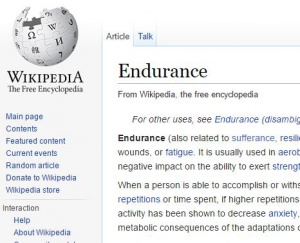Endurance (also related to sufferance, resilience, constitution, fortitude, and hardiness) is the ability of an organism to exert itself and remain active for a long period of time, as well as its ability to resist, withstand, recover from, and have immunity to trauma, wounds, or fatigue. It is usually used in aerobic or anaerobic exercise. The definition of ‘long’ varies according to the type of exertion – minutes for high intensity anaerobic exercise, hours or days for low intensity aerobic exercise. Training for endurance can have a negative impact on the ability to exert strength[1] unless an individual also undertakes resistance training to counteract this effect.
When a person is able to accomplish or withstand a higher amount of effort than their original capabilities their endurance is increasing which to many personnel indicates progress. In looking to improve ones endurance they may slowly increase the amount of repetitions or time spent, if higher repetitions are taken rapidly muscle strength improves while less endurance is gained.[2] Increasing endurance has been proven to release endorphins resulting in a positive mind. The act of gaining endurance through physical activity has been shown to decrease anxiety, depression, and stress, or any chronic disease in total.[3] Although a greater endurance can assist the cardiovascular system it does not imply that any cardiovascular disease can be guaranteed to improve.[4] “The major metabolic consequences of the adaptations of muscle to endurance exercise are a slower utilization of muscle glycogen and blood glucose, a greater reliance on fat oxidation, and less lactate production during exercise of a given intensity.”[5]



